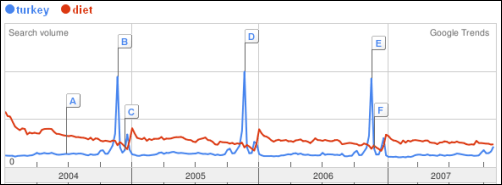Does Google Trends show a solid understanding of relationships?

On the surface, looking at a side-by-side comparison of searches for "turkey" and "diet" shows some pretty obvious correlations, but are we really seeing a correlation between the two things being searched? Even after looking at this chart, I don't think there is necessarily relationship between the two -- people make new years resolutions to lose weight, but that isn't necessarily in response to eating turkey earlier in the month.

In the rain/depression link, the data for each line individually provides more useful information than together. If we analyze depression, over the last several years queries for that term have been declining, but there are still obvious spikes in the winter months -- supporting a known condition called Seasonal Affective Disorder. Overlaying "rain" doesn't necessarily mean there is now a link between the two, but it is possible that corresponding dips and spikes may have a small amount to do with each other.
Overall, I wouldn't bet the bank on things that seem correlated when using Google Trends. It's interesting, but I think the best information you can extract from the service is usually on a term by term basis, not relationships between them.
[images from Google Blogoscoped]